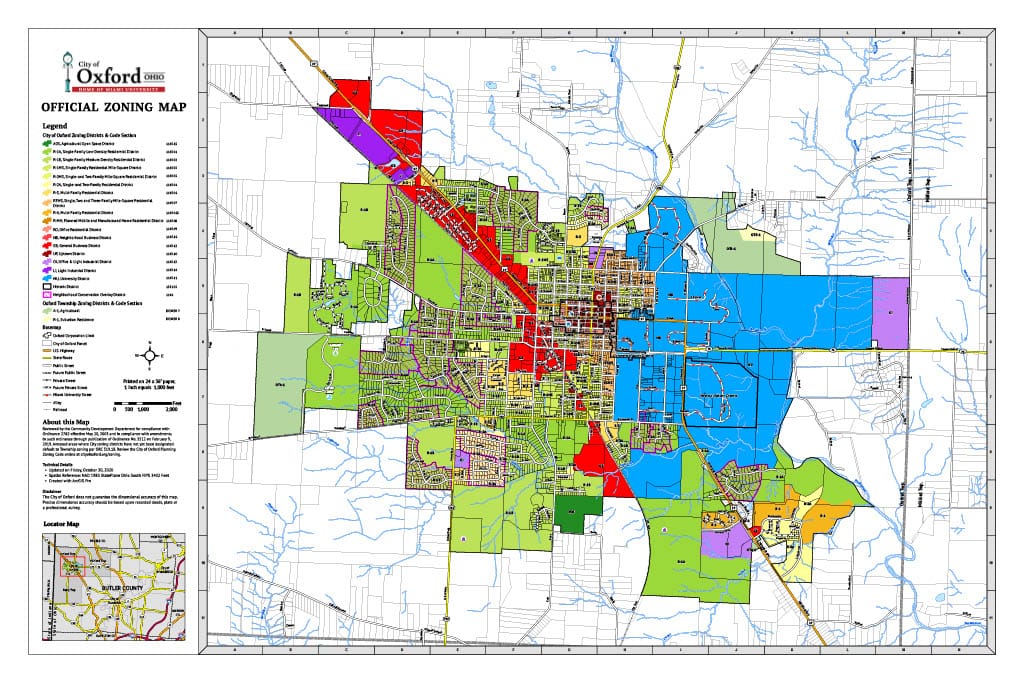City pivots on major zoning code update after consulting firm staff departures
After multiple consultants left the firm Oxford had contracted with to complete a new unified development code for the city, among other projects, the city is pivoting to an internal process for the code update.

Oxford city staff are taking over a major code rewrite that had been outsourced to a consulting firm last summer.
In June 2024, Oxford entered a $199,000 contract with McKenna to create a unified development code for the city, bringing together subdivision and zoning regulations. The contract also covered McKenna’s work with Preservation Forward to create historic preservation design guidelines and a historic preservation plan for the city.
Multiple staff departures from the consulting team put the code rewrite in jeopardy, community development director Sam Perry said during a Planning Commission meeting May 13. Instead of starting over with a new firm, the city negotiated a $30,000 reduction in the contract. McKenna and Preservation Forward will still complete the historic preservation plan and design guidelines, while Oxford city planner Zachary Moore will lead an internal effort to rewrite the code.
“This sequence of doing the historic preservation plan and the design guidelines before we complete the code — what we need to save and protect should inform the zoning code,” Perry said. “Doing them simultaneously was actually kind of concerning to me at the beginning, but that’s how the bidder pitched it, and we accepted it, so actually, I think this works out better.”
The consultants had already created a framework for the new unified development code, including chapter focuses and major themes. Moore, who previously led a zoning update for Wilmington, Ohio, said it’s too early to give a detailed timeline for the project, but it will be delayed from the one-year process McKenna had laid out.
Jason Bracken and David Prytherch, two Oxford City Council representatives on the Planning Commission, will serve with Planning Commission member Ann Kaufman Webster on a working group for the project.
The working group will meet regularly and periodically bring updates to the Planning Commission as a whole during work sessions. Perry said he plans to post draft chapters to the city website as they’re completed to keep the process transparent and allow for feedback. The working group will also bring in local business owners, Miami University representatives, city service workers and other stakeholders throughout the process for advice.
During the work session, Corey Watt encouraged the Planning Commission members to think about their top priorities in the code rewrite, as well as what types of changes they wouldn’t support. The commission will ultimately vote to make a recommendation to City Council, which has the final say in whether to adopt the new code.
Moore said Oxford’s outdated family definition, rarely enforced tree preservation ordinance and procedural reforms are among the biggest issues the city is aiming to address with the unified development code. Other hot-button issues in town like alley development and short-term rental regulations could also be impacted.
The last major overhaul of Oxford’s zoning was in 2003.
Commission recommends rezoning parcel for affordable housing development
During the commission’s regular meeting before the work session, members voted 5-1 to recommend rezoning a city-owned parcel along Hester Road from medium density single family to single and two-family residential. Last week, Oxford City Council agreed to negotiate a contract with a developer for an affordable housing project targeting adults with intellectual and developmental disabilities on the property.
Watt voted against the recommendation because the property, located between Fuller Way to the north and College Inn to the south, doesn’t border any parcels with the same zoning designation.
Mark Radlinski, a Hester Road resident, said he had concerns about the safety of the development and controls to make sure it doesn’t become student housing. Pedestrians crossing US-27 at Hester Road don’t have a flashing signal, and Radlinski said public transportation which may be important for developmentally disabled adults is less available outside the Mile Square.
Another housing development on Hester Road, Oxford Green, had been pitched as senior housing but now has students living there, as well. Radlinski said he’s concerned about how the city can preserve the proposed new development for its intended purpose. Prytherch said the city’s stake in the new proposal as the property owner should help in keeping the units affordable long-term for the intended occupants.
The zoning change will go before Oxford City Council for final approval before being implemented. The city is currently negotiating a contract with developers as the housing proposal is fleshed out, and it will then return to the Planning Commission for approval as a planned development.




